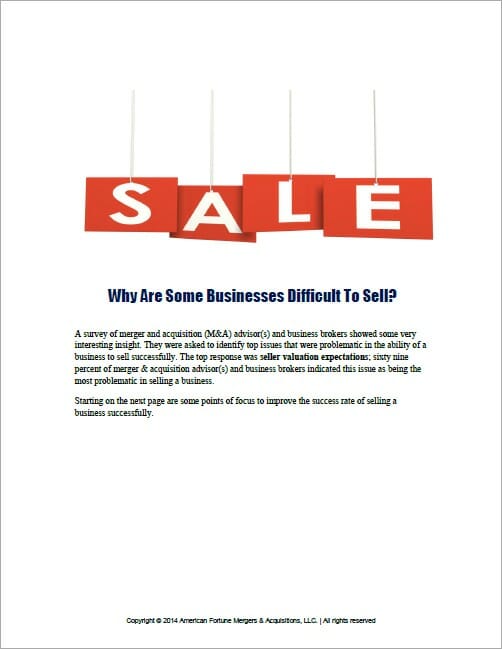Business Valuation Reports Using Six Models
There isn’t a “one-size-fits-all” business valuation report. These reports must undergo some tailoring to ensure that they fit the needs of the business owner. A valuation report for estate planning may look dramatically different from a report where the owner is looking to sell the business. There are many various reasons to have a business valuation report put together. Estate planning, sales, succession planning, or applying for a business loan can lead the owner to a valuation expert.
Typically the business owner takes it upon themselves to appraise their business, but they often miss critical elements in calculating its value. It seems as though they would be the ones to know their company best. Owners usually know the most about their operations and financials, but business valuation experts understand how to connect that knowledge to the market. To develop a cohesive and useful business valuation report, you need extensive experience of your business, the market, and the purpose of the report.
Who Should Create a Business Valuation Report?
Although the business owner and their staff may have the ability to value the business, it’s essential to bring in a professional. Accounting professionals and owners often lack the in-depth knowledge of elements unique to specific types of business valuation reports.
A Business Valuation Expert with a Certified Business Intermediary credential should always be the one to create a formal business valuation report. This certification is vital because it shows proof that these experts understand all business valuation elements and how to develop the right report based on the owner’s needs.
Many intelligent and well-educated business professionals will often downplay a valuation report. When constructed correctly, a company valuation appraisal will factor in the complexity and craft a report that others can’t poke holes through. Business professionals who don’t regularly work in valuations or mergers and acquisitions will have trouble crafting a defensible and high-functioning valuation report.
The Primary Models for Business Valuation Reports
There are the types of valuation reports found most often for various purposes. Some of these reports work best for estate planning, while others help identify ways to boost the company’s worth or showcase its value. As you read through this list, consider what factors of each model would serve your needs best. Take note of any questions and then discuss them with our qualified and certified business valuation experts.
Adjusted Book Value or Net Tangible Assets Valuation Model
The Adjusted Book Value business valuation report goes by many names. Some professionals refer to this model as the “Underlying asset value method” or “net tangible assets valuation.” They all refer to the same valuation model.
Owners who plan to liquidate their company will often use this model. It’s best used to adjust the asset value to represent the assets’ fair market value better. They look closely at assets that are vital to business or operations.
An excellent review of the adjusted book value method is to look at a construction company. The company’s machinery is vital for its operations. Those assets must be present for the company to perform work and generate an income. In contrast, a law office may not need its physical assets to generate an income.
The key to the adjusted book value method is to determine the fair market value of the useful assets against the value of the assets that appear on the books.
Capitalization of Earnings Valuation Model
Experts agree that so far as business valuation services go, capitalization of earnings is the most critical factor. Valuing a business without capitalizing earnings is not an easy feat and will likely produce an unreliable result. Most operating companies such as manufacturers, merchandisers, and any company providing a service should carefully understand the capitalization of earnings and consider it the most important valuation model.
What is the capitalization of earnings? It is the company’s ability to generate earnings or the total worth of the company at the end of its life.
This model relies on historical data to project future earnings. By using the last five years of financials, experts can project future earning potential for the next five years. Business valuation experts use growth rate, present value, and expected earnings figures to create this business valuation report.
Comparable Price Valuation Model
This type of business valuation report showcases the value based on the sale price of similar businesses. There are various requirements to use this model, and often it’s not readily available for private companies.
The comparable price valuation model focuses mostly on the price of at least three comparable businesses sold on the open market. If you have a private company, those sale prices may not accurately reflect the value of your private held business.
The expert would identify three businesses recently sold on the open market to produce this type of valuation report. They would then use the net income, cash flow, EBITDA, and P/E ratio to compute a benchmark value. That information helps establish an industry reference benchmark. The expert would then use that industry reference to calculate the businesses’ value.
Excess Earnings Capacity Valuation Model
The theory that the value of the company equals the value of the tangible assets plus excess earnings is the foundation of the valuation model. This business valuation report uses eight different factors and often requires the adjusted asset value model as a contributing element.
Excess earnings can include goodwill, trademarks, copyrights, patents, and more. These are all items that support the business’s continuation but aren’t usually seen as assets on the books. An inexperienced valuation company could easily overlook elements such as goodwill or pending patents.
When calculating goodwill, a business valuation expert will often use the company’s age, employee turnover, the value of the suppliers and products sold, potential growth, company location, banking relationships, market area, and inventory efficiency.
Excess earnings attributable to intangible assets are the foundation of the goodwill value. After calculating this, the valuation expert will add it to the adjusted asset value for a complete company worth figure.
Net Income Residual Approach Valuation Model
This business valuation report model allows the business to evaluate how easily it could pay dividends to stockholders using its current income that isn’t needed to operate in the future. Essentially, it considers how easily the company could pay dividends with its current income after it pays everything necessary to continue operations. Those dividends are based on earnings after taxes related to the investment at the start of the year. They are then distributed to stockholders rather than retained within the company.
This report evaluates what an investor would pay to participate in the operations of a privately held company.
This valuation type best explores the net income after all the fancy accounting relating to opportunity cost. This report is also useful for allocating resources appropriately and to determine the intrinsic value of that business’ shares. Typically, this reporting method is used along with its book value. Many owners will also use this model to assess their economic profit. Residual income is also of great interest to lenders and may be required before obtaining a loan.
Present Value of Future Income Stream Valuations
How much is your company earning right now? The future income stream’s present value works to consider what an outside party could do regarding leveraged debt. This model works with the concept that an outside party could acquire the business and use it to pay the interest on all open debt.
This model is a variant of the capitalization of earnings report but aims to present the value in future terms. It is often called the leveraged debt concept.
The present value of future income showcases the company’s value based on the forecasts of future earnings. This type of report can enable investors to evaluate the profit they could expect from the investment. By representing the earning potential in present value, it should produce an acceptable level of accurate predicting with a bit of security.
Finding the Right Business Valuation Reports for Your Needs
A comprehensive business valuation may call upon all six of these business valuation report models. A business valuation expert would need to carefully review the company and the purpose of the report to determine which functions would fit the owner best. The valuation report must address what the owner needs to get from the business. Those needs may include boosting business value to enter the open market or to protect the value of the intangible assets during succession planning.
No matter what, the business’ valuation report must hold up through any argument and be defensible against any challenge. Each method has its advantages and disadvantages and may apply in different ways.
Contact American Fortune Mergers and Acquisitions to speak with a business valuation service expert to determine which business valuation report is most appropriate for your needs. You can contact our advisors at 502-244-0480.







